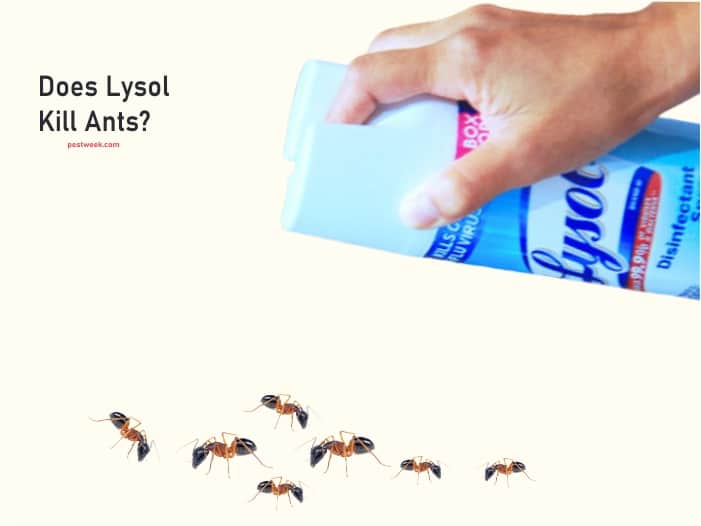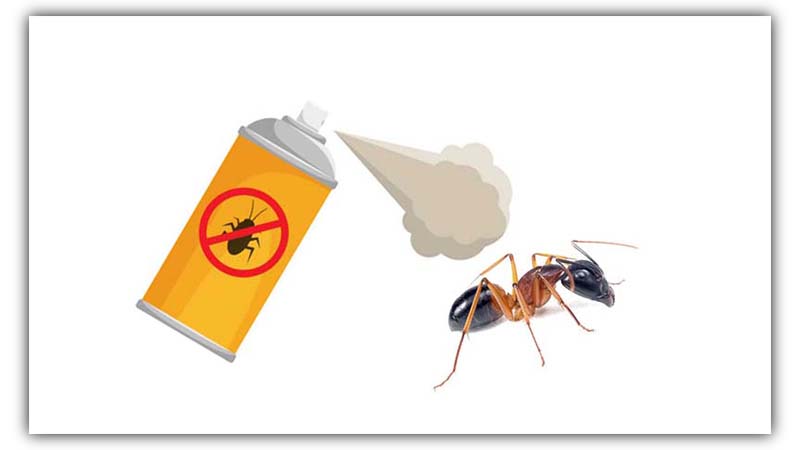‘Does Lysol kill ants?’ Join us on a journey of discovery as we unravel the truth behind this common household query.

1. Does Lysol kill ants?
Absolutely, Lysol can kill ants. It has a chemical called quaternary ammonium, which is in many cleaning products to tackle viruses, bacteria, and mold.
When it comes to ants, spraying them with Lysol containing quaternary ammonium can take them out in a few minutes.
However, it’s important to note that it only works on the ants you spray directly. To get rid of all the ants, you might need to use quite a bit of Lysol.
2. Does Lysol kill ant eggs?
Lysol is toxic to ant eggs but the problem is that those eggs are always hidden deep in a nest.
Once you locate their nest entrance, fill half a cup with Lysol then top it up with an equal amount of hot water. Pour this into the nest to kill the queen and all her eggs.
3. How to kill and repel ants with Lysol
Lysol can be used to get rid of both crawling and flying ants. Simply spray pick up a bottle of Lysol disinfectant and spray it on them. As long as they are covered in the chemicals if you spray close enough, they will die.
1. Ants in kitchen trash cans
Ants can be a serious problem in kitchen trash cans since there is always something to eat out of them. Lysol can be used to get rid of them with the following simple steps:
- Empty they trash can
- Wash it with warm soapy water and let it dry
- Spray it with Lysol disinfectant to repel ants and kitchen fruit flies from it
- Keep the can covered and always ensure that food is not spilled around it
2. Lysol for ants in car
After washing the car, you can spray Lysol on the seats, carpets and the floor to kill and repel any ants that are still hiding in there. For ants in your dashboard, you can use Lysol wipes to get rid of them.
While using Lysol to get rid of ants in a car, get the one that has a lemon fragrance.
3. Cleaning the floor
After cleaning the floor, pour 8 ounces of Lysol deodorizing cleaner with a lemon fragrance into a bucket. Then add 1.5 gallons of warm water and use it to wipe the floor.
This will remove ants in cracks and the smell will also keep them away.
4. Ant hill
If you have an anthill, simply mix 3 cups of Lysol disinfectant cleaner with 5 liters of hot water in a bucket. Add 2 cups of dish soap into the bucket and pour this into the anthill.
This is enough to kill them and their eggs. If the queen is not well hidden, the solution will also get rid of it on contact.
4. How Does Lysol Kill Ants?
As mentioned earlier, Lysol products contain active ingredients that are lethal to ants. These ingredients work in two primary ways – dehydration and asphyxiation.
When Lysol is sprayed directly onto ants, it can cause them to dehydrate and die. This is because the chemicals in Lysol are able to absorb the moisture from the ants’ bodies, leaving them desiccated.
Ants, like many insects, require a certain level of moisture to survive, and without it, they quickly perish.
5. How Long does It take Lysol to kill ants?
Lysol kills ants on contact, meaning it starts working as soon as it comes in direct contact with the ants. However, the total time it takes to completely kill an ant can vary based on the size of the ant and the amount of Lysol sprayed.
Typically, ants begin to show signs of distress immediately after being sprayed and often die within a few minutes. It’s important to ensure that the ants are thoroughly soaked in Lysol for the most effective results.
FAQs
What are the Active ingredients in Lysol that affect Ants?
The primary active ingredients in Lysol that affect ants are ethanol and alkyl dimethyl benzyl ammonium saccharinate. Ethanol has a dehydrating effect on ants, absorbing the moisture from their bodies and leading to their death.
Alkyl dimethyl benzyl ammonium saccharinate, on the other hand, can block the ants’ respiratory system, effectively suffocating them.
Are there Any Precautions or Warnings when Using Lysol for Ant Control?
Yes, while using Lysol for ant control, it’s crucial to remember that Lysol is a strong chemical. It should be used in well-ventilated areas and kept out of reach from children and pets. Avoid contact with skin and eyes as it can cause irritation.
Can Lysol be Used Outdoors to Control Ants?
While Lysol can be used outdoors, it’s not the most effective or environmentally friendly method to control ants. Its effects are temporary and localized, and it won’t reach ants deep inside their colonies.
Additionally, Lysol can be harmful to plants and beneficial insects. It’s recommended to use pesticides specifically designed for outdoor ant control for a more effective and targeted approach. Always remember to follow label instructions when using any pesticide.
Conclusion
So, “Does Lysol kill ants?” Yes, but remember it’s a temporary fix.
If you found this article by Pestweek helpful, share the ant-busting knowledge with your friends and let’s continue the fight against pests together!

Calina Mabel has over 15 years of experience in the field of journalism and communications. Currently, Calina Mabel is the Content Writer for categories such as Cockroach, Ants, Bed Bugs, Mosquito, Rodent, Termite, and Flies on Pestweek.com. She aims to build content for these categories with a focus on providing valuable and accessible information to readers, in order to create the world’s largest knowledge community about Pests.
All content written by Calina Mabel has been reviewed by Emily Carter.


